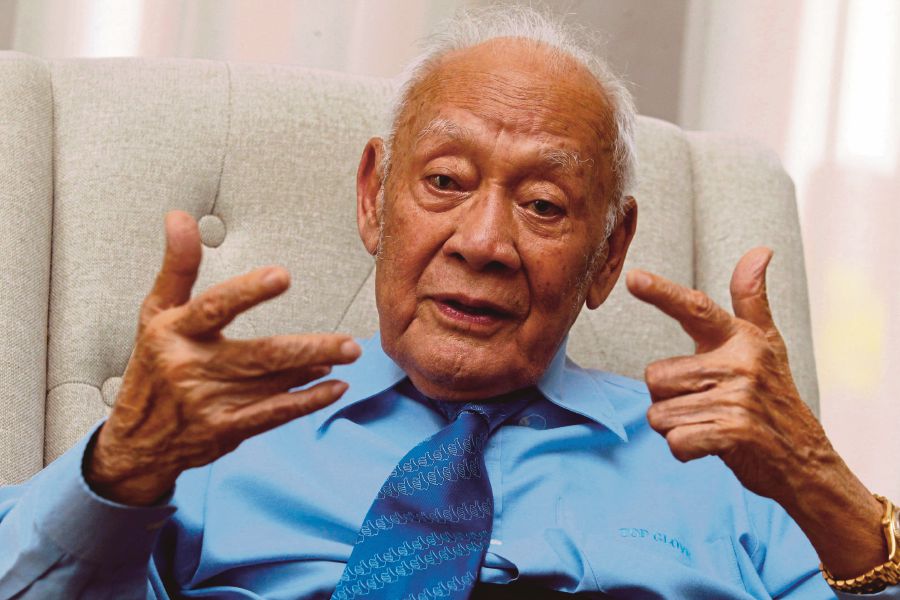KUALA LUMPUR: “HE can eat with the beggars and dine with the King.” That’s the description 89-year-old Tan Sri Arshad Ayub gave when asked of his impression of second prime minister Tun Abdul Razak Hussein.
Arshad’s first interaction with Razak was when he became the principal of the Mara College of Business and Professional Studies in 1965.
Razak, he said, could blend himself with people from all walks of life and positions.
Arshad remembered Razak as “a man of few words but friendly. He was very hardworking. Work was his top priority. His integrity was beyond question. And everyone was prepared to work for him. Some probably would die for him, too”.
Arshad was attached to the Rural Industrial Development Authority (Rida) as assistant rural development officer in 1951 and was seconded as principal of the Rida Training Centre in 1965. Razak was education minister in 1955, and later became rural development minister in 1957.
“I was in a group of 13 Malays to be the first batch for Rida. Razak became the education minister and was later the rural development minister. That’s where I knew Razak. He was the minister responsible for the development of Rida.”
Arshad wasn’t sure who was instrumental in giving his name to Razak for him to be seconded as principal of the training centre.
“I knew some of Razak’s close friends, such as Tan Sri Taib Andak, Tan Sri Ishak Tadin … one of them could have done it. I think it was Taib who made the recommendation. We both came from Muar.”
Arshad, too, had an advantage as he was with the Malayan Civil Service. On top of that, he had the qualifications, having graduated with a Diploma in Agriculture from the College of Agriculture in Serdang, Selangor (now Universiti Putra Malaysia) in 1954 and obtained his Bachelor of Science (Honours) in Economics and Statistics from the University College of Wales, Aberystwyth in the United Kingdom in 1958. In 1964, he pursued a postgraduate Diploma in Business Administration from the Management Development Institute, in Lausanne, Switzerland.
Under Arshad, the training centre became Mara College of Business and Professional Studies. In 1967, it was transformed into Institute Technology Mara (ITM), of which he became its first director, serving from 1965 to 1975. It is now one of the most successful education initiatives in the country.
“That’s where I got to know Razak better. In the first three to four years, Razak visited us in Jalan Othman (in Petaling Jaya) every three months. He attended the events we organised. He joined some of the dance parties.”
One event that Arshad could not forget was during the ground-breaking ceremony for then ITM Shah Alam.
“Normally, Razak would come to our events with four or five officials. However, this time, everyone came. This was after the Umno Assembly, if I recall correctly. I felt “terkilan” (aggrieved) because we were not prepared to receive so many people. Students had to look for chairs,” he said.
Arshad said he was also lucky that Razak had given him the freedom to run ITM. For the 10 years that he was with ITM, there was nothing official or unofficial from Razak on what he could or could not do.
In fact, there were many complaints against Arshad, especially on two significant things that the ITM director did: one was the changing of the name of the institution to MIT (Mara Institute of Technology) and the decision to use English language as a medium of instruction throughout ITM.
“I was stubborn (in my ways). Many were angry with me for doing this. Many probably went to Razak to complain about this. But he didn’t say anything. He didn’t tell me anything. I took it that he agreed in silence. If he had asked me, I would have told him the reasons I did it.
“Looking back, I didn’t know if I did the right thing. But today, I am more convinced that I did,” he said, adding that ITM also introduced other foreign languages as subjects for students to learn.
Arshad, who is a member of the Board of Trustees of the Tun Razak Foundation, was deputy governor of Bank Negara Malaysia when Razak died of leukaemia while seeking treatment in London in 1976.
Given Razak’s uncanny ability to put the right people in the right positions, could Arshad have been the Bank Negara governor if Razak had lived longer to serve as Prime Minister? This could be as good as anyone’s guess.
Arshad is featured in a new book on Razak, titled Fulfilling a Legacy, which will be launched on Aug 29.






